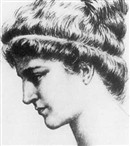HIPATIA DE ALEJANDRIA / HYPATIA OF ALEXANDRIA

 About Hypatia
About Hypatia
 Acerca de Hipatia
Acerca de Hipatia
 Great Documental on Alexandria and Hypatia
Great Documental on Alexandria and Hypatia
 Agora Trailer
Agora Trailer
“All formal dogmatic religions are fallacious and must never be accepted by self-respecting persons as final.”
“Reserve your right to think, for even to think wrongly is better than not to think at all."
"Life is an unfoldment, and the further we travel the more truth we can comprehend. To understand the things that are at our door is the best preparation for understanding those that lie beyond.
Carl Sagan's words on Hypatia:
"The last scientist who worked in the Library was a mathematician, astronomer, physicist and the head of the Neo-Platonist school of philosophy--an extraordinary range of accomplishments for any individual in any age. Her name was Hypatia. She was born in Alexandria in 370. At a time when women had few options, and were treated as property, Hypatia moved freely and unselfconsciously through traditional male domains. By all accounts she was a great beauty. She had many suitors but rejected all offers of marriage. The Alexandria of Hypatia's time--by then long under Roman rule--was a city under grave strain. Slavery had sapped classical civilization of its vitality. The growing Christian Church was consolidating its power and attempting to eradicate pagan influence and culture. Hypatia stood at the epicenter of these mighty social forces. Cyril, the Archbishop of Alexandria, despised her because of her close friendship with the Roman Governor, and because she was a symbol of learning and science, which were largely identified by the early Church with paganism. In great personal danger, she continued to teach and publish, until, in the year 415, on her way to work she was set upon by a fanatical mob of Cyril's parishioners. They dragged her from her chariot, tore off her clothes, and, armed with abalone shells, flayed her flesh from her bones. Her remains were burned, her works obliterated, her name forgotten. Cyril was made a saint."
~ Carl Sagan
From “Cosmos”
Las palabras de Carl Sagan acerca de Hipatia:
"El último científico que trabajó en la Biblioteca fue un matemático, astrónomo, físico y el director de la escuela neo-platónico de la filosofía -. Una extraordinaria gama de logros para cualquier persona en cualquier edad, Su nombre era Hipatia. Nació en. Alejandría en 370. en una época cuando las mujeres tenían pocas opciones y eran tratadas como propiedad, Hipatia se movía libremente y sin afectación por los dominios tradicionalmente masculinos. Era una gran belleza. tenía muchos pretendientes pero rechazó todas las ofertas de matrimonio. La Alejandría de la época de Hipatia - por mucho tiempo bajo la dominación romana -... era una ciudad en tensión. La esclavitud había agotado a la civilización clásica de su vitalidad. La creciente Iglesia cristiana estaba consolidando su poder e intentando extirpar la influencia pagana y la cultura. Hipatia se situaba en el el epicentro de estas poderosas fuerzas sociales. Cirilo, el arzobispo de Alejandría, la despreciaba por su estrecha amistad con el gobernador romano y porque era un símbolo de cultura y la ciencia, los cuales fueron identificados en gran medida por la Iglesia primitiva con el paganismo. Con gran peligro personal, ella continuó enseñando y publicando, hasta que, en el año 415, cuando se dirigía a trabajar, fue atacada por una turba fanática de feligreses de Cirilo. La arrancaron de su carruaje, rompieron sus vestidos y, armados con conchas marinas, la desollaron arrancándole la carne de los huesos. sus restos fueron quemados, sus obras destruidas, su nombre olvidado. Cirilo fue proclamado santo. "
~ Carl Sagan
Desde "Cosmos"